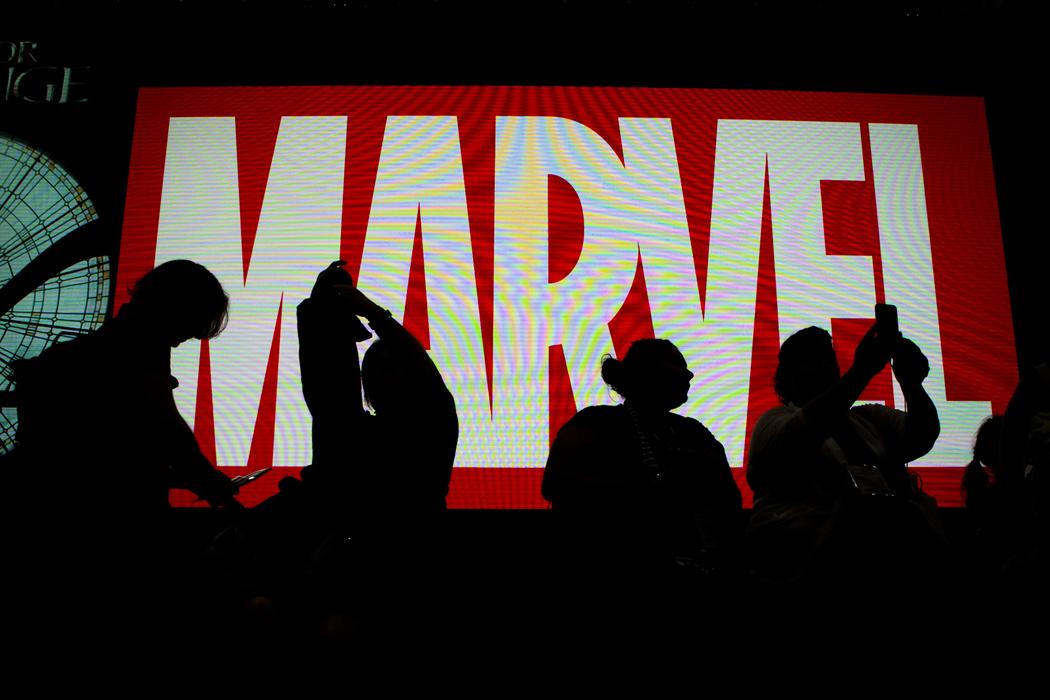Demand more original films, not remakes, from Hollywood


Attendees sit in front of an illuminated Marvel sign during the second day of Comic-Con 2016. (Harrison Hill/Los Angeles Times/TNS)
Let’s look at the films coming out this year.
Guardians of the Galaxy — again. Thor — again. Spider-man, Cars, Beauty and the Beast and Star Wars — all again. If you need proof that Hollywood is struggling to make original content, look no farther than the box offices of the past few years.
By far, the worst movie I saw in 2016 was “Fantastic Beasts and Where to Find Them.” On top of unimpressive performances and poor pacing, its characters were painfully boring, generic archetypes. It wasn’t only a mediocre movie but a stain on one of the most beloved fantasy franchises in history. This type of shameless cash grab illustrates perfectly the current state of the film industry. Instead of remaking and reshaping characters, storylines and brands that have already been successful, it’s time to invest in original work.
There wouldn’t be as much to complain about if the vast majority of sequels, prequels and reboots didn’t fail to match the quality of their predecessors. Films such as “Ghostbusters,” “X-Men Apocalypse” and “Ben-Hur” — all of which came out in 2016 — failed to capture what made their original films great. Specifically, “Ghostbusters” lacked the quality wit and humor that made the old movies a hit, often trying too hard to reference the classic ’80s film instead of coming up with new material for today’s fanbase.
Good examples of sequels and spin-offs, such as “Captain America: Civil War” or “Deadpool” — which made $1.15 billion and $783 million, respectively — were enjoyable and well received. But for every successful blockbuster spin-off such as “Deadpool,” there’s always an “Assassin’s Creed” or a “World of Warcraft” — films that undoubtedly flopped at the box office. “World of Warcraft” raked in a mere $430 million and “Assassin’s Creed” didn’t even double its $125 million production budget, making less than $240 million worldwide.
“Deadpool” may be an X-Men spin-off, but it artfully confronted that fact in the film numerous times and defused it with realistic humor, contributing to its entertaining and imaginative tone throughout. Meanwhile “Assassin’s Creed” mixed horrendous acting with a convoluted plot and bland characters to make the film an even greater disappointment than I’d imagined.
If the box office numbers for these films don’t show it clearly enough, critics and fan ratings should. “Assassin’s Creed” holds a meager score of 3.9 out 10 among critics on Rotten Tomatoes while “Deadpool” can boast a 6.9 rating and two Golden Globe nominations.
Reboots, sequels and prequels are safe choices — they have a much better chance of making money because people will buy tickets just to see their favorite characters on the big screen again. Even when sequel films fail financially, they still make more money, on average, relative to newly made, original movies.
The average box office earnings for a sequel in 2015 was more than $160 million while the average for all movies was less than $20 million. So while a sequel is more likely to disappoint critically, the risk of making one as opposed to a new movie is much smaller — because even if the sequel is just down right bad, it will almost always make more money than a decent new movie.
But the potential for absolute disappointment is even greater than in an original film.
Take a much-loved character such as Dr. Doom in “Fantastic Four” and make him look like a bunch of crushed up Mountain Dew cans and you’ve done for Marvel fans what “Fuller House” has done to the ’90s generation.
And the power of making reboots and sequels lies, most essentially, in the idea of creating brands. A brand associated with a film also means the potential to not only sell tickets and DVDs but shirts, toys, posters and a plethora of other merchandise items as well — a goal much harder to achieve with solitary movies.
Star Wars is a prime example of how profitable a well-done remake can be. The films do well enough on their own solely through ticket sales — with “Rogue One” making more than $1 billion worldwide — but the entire Star Wars franchise is fueled in large part by merchandise. The franchise made more than $32 billion in merchandising sales in its history and that number is set to increase by $1.5 billion every year, according to both Lucasfilm and industry analysts at NPD Group.
This rebranding strategy doesn’t always equal success for Hollywood either. Box office results and critical reception from 2016 show how audiences are becoming exhausted with these movies too. Films using recycled stories and characters including “Zoolander 2,” “Inferno” and “Independence Day: Resurgence,” failed to perform well at the box office or receive positive scores on sites such as Rotten Tomatoes.
The effort put into squeezing every possible dollar out of a brand is becoming absurd, to the extent that Hollywood is now making movies about Tetris and emojis. Innovation pushes an industry forward, and Hollywood needs more of it. No one will fund original and creative movies if they think they can earn more money on another “Pitch Perfect” film.
We, as an audience, should support films that bring forth new and original stories, as opposed to ones just spinning the same tale. These are mostly art house films such as “Sing Street” and “Red Turtle” but almost anything with original characters, plotlines and content should be encouraged. “Split” and “Get Out” are recent successful films that show how innovative ideas can sell well and be critical darlings.
As for movie directors, it’s time to start taking more risks and invest in something new. Or at the very least, be willing to devote time, effort and money into making your sequels and reboots quality films. The truth is, with the huge profit incentive to make new movies associated with brands, Hollywood will probably never stop cranking them out. But we, as viewers, can at least voice our opinions about how bad a job they’re doing on outlets such as Rotten Tomatoes or Reddit to make sure if producers and directors are going to recycle old ideas, they at least do so well.
Before you go out and see the new “Power Rangers” or “Beauty and the Beast,” find something you haven’t already watched.
Thomas primarily writes about visual media and gaming for The Pitt News.
Write to him at tmw79@pitt.edu.
Recent Posts
SGB introduces new governing code bill and addresses rumors of ICE on campus
At its weekly meeting at Nordy’s Place on Tuesday, Student Government Board introduced an omnibus…
Opinion | School should be in the summer
Although this may be controversial, I believe that from this data, it is evident that…
Weathering the storm: Pittsburgh teams have tackled some of the toughest environments
The end of the year in western Pennsylvania is always marked by two things —…
Notes From an Average Girl // Notes on Book Banning
In this edition of Notes From an Average Girl, senior staff writer Madeline Milchman writes…
To Be Honest // Yup, it is that damn phone
In this edition of To Be Honest, staff writer Evin Verbrugge writes about her phone…
Meaning at the Movies | Portraying Toxic ‘Adolescence’
In this edition of Meaning at the Movies, staff writer Lauren Deaton explores the mini-series…

